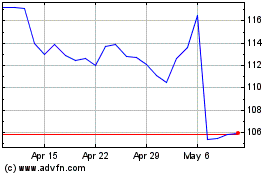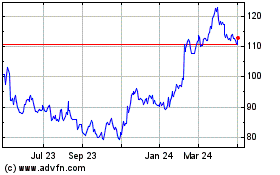By Erich Schwartzel and Joe Flint
LOS ANGELES -- Comcast Corp. and Walt Disney Co. are fighting to
win over 21st Century Fox Inc. shareholders and acquire major
assets of Rupert Murdoch's media empire. After the boardroom fight
comes the next battle: winning over Washington.
Both bids are expected to get a close look from antitrust
regulators at the Justice Department, which earlier this week
suffered a bruising loss when a judge approved AT&T Inc.'s
acquisition of Time Warner Inc. with no conditions.
The Justice Department's antitrust chief said Wednesday he
wouldn't let the outcome deter him from challenging other deals. "I
don't think our case or evidence or theories were flawed," Makan
Delrahim said, adding that "a different judge could have ruled
completely differently."
Comcast executives have begun reaching out to Fox and Comcast
shareholders to make their case for the merger, people familiar
with the matter say.
Because Disney and Comcast, like Fox, produce television shows
and movies, either deal would represent a horizontal merger, in
which direct rivals combine, further limiting the number of
competitors in the industry.
Comcast's regulatory path is different from Disney's in that it
also includes vertical aspects, marrying different elements of the
content production and distribution food chain. The AT&T deal
was a vertical merger, and its approval was seen as an encouraging
sign for Comcast's case.
Antitrust regulators have taken a harder line on horizontal
mergers than on vertical ones and often require the buyer to sell
off some assets to maintain a level of competition. Disney and
Comcast already have signaled that they are willing to give up
certain assets to secure approval.
Both companies have indicated a willingness to shed Fox's
collection of regional sports networks in the U.S. Comcast has said
it would divest itself of any other Fox assets that Disney offers
up as regulatory concessions, according to people close to
Comcast.
The sports assets that would be combined in either a Disney-Fox
or Comcast-Fox deal will get heavy scrutiny. Fox is selling nearly
two-dozen regional sports networks including in New York, Los
Angeles and Detroit. Its marquee property is the YES Network, the
television home of the New York Yankees. Fox's regional sports
networks have been valued at $23 billion by industry analysts.
Comcast's nine regional sports networks carry local teams in
major markets such as Philadelphia and Chicago. Its SNY, the home
of the New York Mets, competes for advertisers with Fox's YES. The
addition of Fox's channels would make Comcast the home for local
sports in just about every major television market. That could
potentially give it leverage in negotiations with other
distributors for the rights to carry those channels. However, the
channels for the most part don't compete against one another.
Disney doesn't operate any local sports channels, but it owns
ESPN, which has several national channels and rights to just about
every major sport. The addition of Fox's 22 regional channels could
give it tremendous clout both locally and nationally with pay-TV
distributors, sports leagues and advertisers.
Neither proposed deal includes the Fox Broadcasting network, its
local TV stations, the Fox News and Fox Business channels or the
national sports channel Fox Sports 1. The broadcast businesses in
particular would have likely made either deal virtually impossible
to get past regulators because Disney owns ABC and Comcast owns
NBC.
News Corp, parent of The Wall Street Journal, and 21st Century
Fox share common ownership.
Hulu, the video-streaming service, will also be a focal point in
the regulatory review. Fox, Comcast and Disney each own 30%, while
Time Warner -- soon to be part of AT&T -- owns the other 10%.
Whoever ends up with the Fox assets would also end up with majority
control of Hulu.
When Comcast acquired its stake in Hulu as part of its
NBCUniversal acquisition, regulators were concerned that it would
have incentive to protect its own core distribution and content
businesses rather than enable a potential rival to grow. As a
result, the government required Comcast to become a "silent
partner" in Hulu with no say in management, an agreement that
expires at the end of August.
Comcast has said it would be willing to divest the Fox stake in
Hulu if it were to become a sticking point for approval.
Brian Roberts, Comcast chief executive, said Wednesday, "We
believe our transaction is as or more likely to receive regulatory
approval than Disney's."
Disney CEO Robert Iger said in May that his company was "deep in
the regulatory process" and declined to comment further.
The bidders have had different experiences dealing with
regulators. Disney has had mostly smaller deals that bring new
brands like Pixar Animation and Lucasfilm Ltd. into the fold. Those
acquisitions carried few regulatory concerns.
Comcast, meanwhile, saw its deal to acquire NBCUniversal stretch
on for more than a year before being approved in early 2011. The
acquisition was similar to its pursuit of Fox, in that the deal was
seen as a way for a traditional media company to try to guard
against disruptions in digital viewing habits. Eventually,
regulators provided a list of rules for the company, including a
requirement it offer its content to digital video providers under
the same terms and conditions it gave cable or satellite
providers.
Both bidders are expected to make the case that while well-known
U.S. brands such as Twentieth Century Fox are part of an
acquisition, from a financial standpoint much of the revenue from
the assets Fox is selling comes from European international
operations, including pay-TV operator Sky as well as Star India.
Both Disney and Comcast are eager to beef up their international
assets with Fox's holdings.
Disney's $52.4 billion bid, announced in December, has already
spent several months moving through the regulatory review process.
However, people close to Comcast counter that it isn't so far
behind that it can't catch up. The company has already received a
letter from the Justice Dept. seeking information as part of its
review of the Disney-Fox transaction.
--Sarah Krouse and Shalini Ramachandran contributed to the
article.
Write to Erich Schwartzel at erich.schwartzel@wsj.com and Joe
Flint at joe.flint@wsj.com
(END) Dow Jones Newswires
June 14, 2018 19:13 ET (23:13 GMT)
Copyright (c) 2018 Dow Jones & Company, Inc.
Walt Disney (NYSE:DIS)
Historical Stock Chart
From Mar 2024 to Apr 2024

Walt Disney (NYSE:DIS)
Historical Stock Chart
From Apr 2023 to Apr 2024
